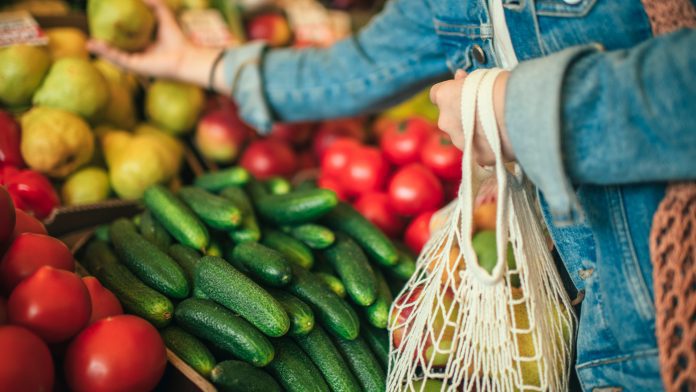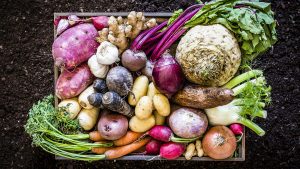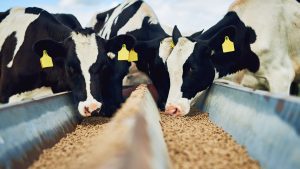
Dr Marco Springmann outlines the urgent need to adopt more sustainable diets to safeguard global food supplies as well as public and planetary health.
What we eat has a huge impact on our health, and the health of our planet. Researchers have revealed that if current trends in food production and diets continue, the Paris Climate Agreement’s goal of limiting the increase in global temperature to 1.5°C by 2050 would be exceeded in just 10 to 20 years, and the 2°C target by the end of the century, even if other sources of greenhouse gas emissions achieve net-zero.
As populations grow, and demands on food production increase, it is vital that measures are taken now to encourage sustainable diets and food systems that not only mitigate further environmental damage but reduce the burden of diet-related diseases including heart disease, stroke, cancer, and diabetes. Calls for state interventions to address the climate and health crisis associated with the food industry have highlighted the need to reduce meat and dairy consumption which is associated with approximately 14.5% of total global greenhouse gas emissions. So impactful are our food choices on planetary health that researchers have estimated that if the world’s population adopted a plant-based diet, global land use for agriculture would be reduced by 75%.
To discuss the impact of the food environment on public and planetary health and how food systems could be transformed to promote healthier and more sustainable diets, Health Europa Quarterly spoke to Dr Marco Springmann who is a senior researcher in population health at the University of Oxford.
The UK Government recently published its national food strategy which garnered quite a lot of criticism. What do you think were the key shortcomings of the strategy in terms of its efforts to improve planetary health and promote more sustainable diets?
The government’s initial report on the National Food Strategy was completely inadequate when you consider the health and environmental impacts of diet. It focused predominantly on processed foods and sugar and sure enough, those are problems that have to be addressed, but the whole area of sustainability, especially when it comes to its relationship with overconsumption of animal source foods, was completely ignored. It was interpreted in such a way that implied the public does not want a tax on certain foods, when in fact, their own survey reported that over 50% of respondents would not be against it.
We know from our studies that if we do not tackle the overconsumption of animal source foods, there is little hope of achieving the target set by the Climate Change Committee of reducing food-related emissions, or indeed any other target that researchers have come up with to meet the Paris Climate Agreement and stay within other environmental limits. The overconsumption of red and processed meat, for example, is responsible for a higher number of diet-related diseases than sugary beverages. The evidence is even clearer when you look at the epidemiological evidence. Even the few progressive proposals like taxes on processed foods and sugar content, instead of just taxes on sugary drinks, were not picked up at all.
It was a huge disappointment and a huge, missed opportunity. How often will there be an occasion where you can compile a national food strategy and consult widely on what needs to be done to transform the national food system to make it healthier and more sustainable?
Can you outline some of the key environmental impacts of the meat and dairy industries and how these compare to a plant-based diet?
Animal source foods, particularly ruminant animals, have a high emissions footprint compared to plant foods.
Animal source foods have a high impact because of three types of greenhouse gases. First, there is carbon dioxide which is, for example, emitted when forested land is cleared for pastures or to grow feed. Producers often want to give the impression that an animal is completely grass-fed, but according to statistics, that is very rarely true. There is usually some co-feeding of other foods as well.
Second, there is a nitrous oxide which is emitted when crops are fertilised. And a lot of fertilised feed crops are needed to produce animal source foods. As an example, for one to grow one kilogram, it needs to eat 10-50 kg of feed, and that feed will need to be grown and fertilised. All animal source foods require multiple inputs in the form of fertilisers compared to crops produced for direct human consumption.
Lastly, there is methane which is generated by ruminant animals such as cows and sheep when they digest food. It is also produced when manure from any animal is stored.
Taking all three types of emissions together results in animal source foods having an outsized emissions footprint compared to plant-based foods.
Should there be a greater focus on strengthening domestic food production?
While we should regionally produce what a healthy and sustainable diet requires, there is always trade within food-producing regions and most of the fruits and vegetables in the UK are imported from mainland Europe. Nonetheless, the food production system in the UK is not adequate when you measure it against the criteria for a healthy and sustainable diet. High production of animal source foods, some of which are exported, not only contributes to diet-related diseases and greenhouse gas emissions in this country but also increases diet-related diseases in other countries too. There needs to be a revaluation of the foods that countries grow.
If you consider European diets more broadly, a healthy and sustainable diet should contain 80 – 90% less red meat, 50% less dairy and sugar and 30 to 50% more fruits, vegetables, and legumes. Those other products will need to be grown somewhere and there is surely enough land if we reduce our reliance on animal source foods.
Every country really needs to contribute to this transformation of the food systems.
How could governments incentivise farmers to diversify food production?
Direct levers for incentivising farmers to change how they produce food are really about restructuring agricultural subsidies. We recently published a study in Nature Communications that looked at ways of reforming agricultural subsidies, and we found that most subsidies are used, at least implicitly to grow foods that are neither healthy nor sustainable. To change that we looked at what would happen if at least half of the subsidies were used for the production of healthier and more sustainable food products, like fruits, vegetables, legumes, and nuts. In the EU, production would increase by at least 20% meaning consumption would increase by roughly 10% due to changes in relative prices. Equally, this would mean one more serving of fruit and vegetable per day for each European citizen.
If the population is healthier by eating healthier foods, you will have a healthier labour force. This means less disease burden and the potential for people to work longer. If you factor that into your economic analysis, there would not be an economic penalty when roughly up to half of the subsidies are used to support the production of healthy and sustainable foods. From a health, environmental and economic perspective, it is a no-brainer.
Political implications are stalling this shift in our food system, both at the EU level and in the UK. The new Agricultural Bill in the UK pays lip service to using public money for public goods, such as ecosystem services, so the rhetoric is definitely there, but the devil is very much in the detail. The government can just define its way out of it by saying food is an ecosystem service so, in effect, it does not need to change anything.
What could businesses do to promote more positive nutrition and help the consumer to make better choices?
There have been studies around the impact of labelling, and while it builds up a very good infrastructure that can be used for other regulations, I do not think it will lead to massive changes in consumption patterns. A better method would be to couple information provision tools like labelling or changes in dietary guidelines with fiscal incentives, making unhealthy and unsustainable products more expensive, and healthy and sustainable diets more affordable.
From an environmental perspective, we can think about taxing foods in relation to their greenhouse gas emissions. By integrating the climate change footprint or climate change costs into the price of products at the point of consumption, you give the consumer more information. You are not prohibiting the consumer from buying those products but as an example, a piece of beef is responsible for a certain level of climate impact, which will have an economic cost. Normally, we would all need to pay for this through our taxes if there are more extreme heat events and other disasters. So instead of doing that, you pay a bit more, and we collect the money which, in turn, provides an incentive for consumers to maybe change to cheaper, less polluting products.
Taxes at the point of consumption could generate revenue that the government can put towards public health promotion campaigns and community-based interventions to help low-income households to change what they are cooking, how they are eating, and where they are buying products. This is important to ensure that such an instrument is not financially regressive for low-income households and to ensure sustainable diets are affordable.
Last year, we published a paper on the cost of diets and found that the healthiest and most sustainable diets in the UK are also the least expensive. A flexitarian diet, whereby the consumer may eat some meat occasionally would be roughly 10% less expensive and a well-balanced, plant-based diet would be up to a third less expensive. This relies on people buying the basic ingredients and cooking from scratch as opposed to buying more expensive meat substitutes.

Last year we published a paper on the cost of diets and found that the healthiest and most sustainable diets in the UK are also the least expensive
Are there examples of countries that are transforming their food systems and supporting that shift to more sustainable diets?
Norway has recently started reforming its national dietary guidelines to incorporate more sustainable diets, and some other Scandinavian countries are in the process as well. Coming up with more fiscal incentives is hard and will probably take a little bit of time.
A couple of European countries have commissions and consultancies ongoing. Exercises that are inclusive and encourage broad, public participation usually work better, and certainly help to abate the notion that this is a culture war. This is neither a culture war nor a left and right issue. Climate change is happening and there are diet-related health impacts that affect everybody.
One cannot count so much on the leadership of politicians because they are afraid of public backlash. Civil society and non-governmental organisations need to lead. We also need civil society initiatives to raise awareness and be very loud to push politicians to act on what is usually their promise of preserving the environment and people’s health.

Taxes at the point of consumption could generate revenue that the government can put towards public health promotion campaigns and community-based interventions to help low-income households
What could be the long-term consequences globally if our current food environment does not change and bolder action is not taken to support long-term food security?
We are headed for an environmental and health disaster if we do not change course. In a large study carried out in 2018, we calculated that environmental resource demand might increase by 50 – 90% if we do not change course, and by 2050, we would exceed all environmental limits that are related to the food system. This would mean more extreme weather events due to climate change, potential disruptions in the water flow and ecosystems related to water bodies, more land-use changes and biodiversity loss, which is already high, and disruptions in biogeochemical flows of nitrogen and phosphorus that could lead to more dead zones in the oceans.
Diet-related diseases already make up roughly 20% of all deaths and take more lives per year than COVID has been held responsible for, yet we do not treat it with the same urgency. These diseases will only go away through us changing our diets and politicians creating a food environment that helps us to change our diets.
We calculated that if all European countries, including the UK, continued with their current diet patterns, it would take more than three Earths to dilute food-related greenhouse gases enough to avoid dangerous levels of warming. How we are eating at the moment is completely unsustainable.
Marco Springmann
Senior Researcher on Environmental Sustainability and Public Health
University of Oxford
https://www.oxfordmartin.ox.ac.uk/food/
https://www.linkedin.com/company/oxford-martin-school/
https://www.facebook.com/oxfordmartinschool
https://twitter.com/oxmartinschool
https://www.youtube.com/user/21school
https://www.instagram.com/oxmartinschool/
This article is from issue 22 of Health Europa Quarterly. Click here to get your free subscription today.









